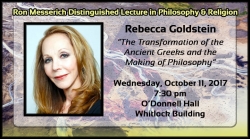Rebecca Goldstein
Rebecca Newberger Goldstein is a philosopher, novelist, and a MacArthur Fellow. Growing up in White Plains, New York, Goldstein graduated summa cum laude from Barnard College, where she received the Montague Prize for Excellence in Philosophy, before heading to Princeton University, where she earned her Ph.D. in philosophy and was awarded a National Science Foundation Fellowship and a Whiting Foundation Fellowship. When Goldstein became a MacArthur Fellow, receiving the prize which is popularly known as the “Genius Award,” the MacArthur Foundation described her work in the following words:
Rebecca Goldstein is a writer whose novels and short stories dramatize the concerns of philosophy without sacrificing the demands of imaginative storytelling. Her books tell a compelling story as they describe with wit, compassion and originality the interaction of mind and heart. In her fiction her characters confront problems of faith: religious faith and faith in an ability to comprehend the mysteries of the physical world as complementary to moral and emotional states of being. Goldstein’s writings emerge as brilliant arguments for the belief that fiction in our time may be the best vehicle for involving readers in questions of morality and existence.
Dr. Goldstein’s most recent book, Plato at the Googleplex: Why Philosophy Won't Go Away (2014), has been a critical and popular success, garnering overwhelmingly positive reviews and generating feature articles in The Washington Post, The Guardian, The Times Literary Supplement, The Times Higher Education Supplement, Prospect, and The Atlantic, with The Washington Post citing it as one of the best books of the year. Plato at the Googleplex alternates between expository chapters, which attempt to place Plato in the context of his extraordinary culture, and modern-day dialogues, which feature Plato himself engaging with the issues of the 21st century. So, for example, when he visits the Googleplex, the headquarters of Google, in Mountain View, CA, he discusses whether ethics can be crowdsourced with his media escort and a software engineer. He also debates a tiger mother on how to raise a child, goes on Fox News to speak about the importance of reason, and has his brain scanned, engaging two neuroscientists on the question of whether free will and moral agency are compatible with the findings of neuroscience.
After earning her Ph.D., Goldstein returned to her alma mater, where she taught courses in philosophy of science, philosophy of mind and philosophy of mathematics, and pursued an interest also in the history of philosophy. It was some time during her tenure at Barnard that, to her own surprise, she used a summer vacation to write her first novel, The Mind-Body Problem, published by Random House to critical and popular acclaim. More novels followed: The Late-Summer Passion of a Woman of Mind; The Dark Sister, which received the Whiting Writer’s Award; Mazel, which received the 1995 National Jewish Book Award and the 1995 Edward Lewis Wallant Award; and Properties of Light: A Novel of Love, Betrayal, and Quantum Physics. Her book of short stories, Strange Attractors, received a National Jewish Book Honor Award. Goldstein’s latest novel, Thirty-Six Arguments for the Existence of God: A Work of Fiction, published in 2010, was named the best fiction book of the year by The Christian Science Monitor and among the top eleven of that year by The Washington Post.
Having been approached to contribute a book to Norton's series on great scientific discoveries, Dr. Goldstein decided to write about Incompleteness Theorems. Her 2005 book, Incompleteness: The Proof and Paradox of Kurt Gödel, was featured in articles in The New Yorker and The New York Times, received numerous favorable reviews, and was named one of the best books of the year by Discover magazine, the Chicago Tribune, and the New York Sun. Her next book, part of a series on great Jewish thinkers and themes, was Betraying Spinoza: The Renegade Jew who Gave Us Modernity, published in May 2006; it won the 2006 Koret International Jewish Book Award in Jewish Thought.
Goldstein is an elected member of The American Academy of Arts and Sciences and a recipient of the National Humanities Medal (2015). In 2006 she received a Guggenheim Fellowship and a Radcliffe Fellowship. In 2008, she was designated a Humanist Laureate by the International Academy of Humanism, and was awarded an Honorary Doctorate by Emerson College, where she gave the commencement address. Goldstein has been designated Humanist of the Year 2011 by the American Humanist Association, and Freethought Heroine 2011 by the Freedom from Religion Foundation. In that year she also delivered the Tanner Lectures on Human Values at Yale University, entitled "The Ancient Quarrel: Philosophy and Literature," which was published by University of Utah Press.
In addition to Barnard College, Goldstein has taught in the Columbia MFA writing program and in the department of philosophy at Rutgers, has been a visiting scholar at Brandeis University, and taught for five years as a Visiting Professor in the Department of Philosophy at Trinity College in Hartford, Connecticut. In 2006-2007, she was a Fellow at the Radcliffe Institute for Advanced Study at Harvard University, and a Guggenheim Fellow. She was the Miller Scholar at the Santa Fe Institute in 2011, a Franke Visiting Fellow at the Whitney Humanities Center at Yale University in 2012, and the Montgomery Fellow at Dartmouth College in 2013. She was appointed a Visiting Professor of Philosophy at the New College of the Humanities in London, U.K. in 2011, and continues to lecture there. As of 2016 she has been a Visiting Professor at New York University. She serves on the World Economic Forum's Council on Values.
Source:
http://www.rebeccagoldstein.com/biocv
https://www.edge.org/conversation/rebecca_newberger_goldstein-the-mattering-instinct
Sponsored by the Department of Philosophy and Religion, and the Honors Program.
Published on October 11, 2017
